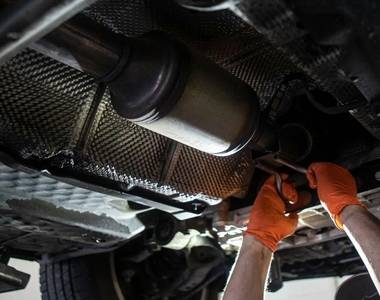So you've decided to sell your car. All your paperwork is ready to go and you're ready to make the transaction. Before you move forward, there's one thing you still have to do: prepare it for sale.

Discover 8 key steps to prepare your car for sale. Set the right asking price and negotiate multiple offers successfully with the help of our detailed guide.
Getting Your Car Ready to Sell: An 8-Step Guide

(Source)
Whether you're selling your car online, selling your car privately, or selling your car to a dealership, you have to get it ready before photographing it and showing it to potential buyers.
Preparation is one of the first steps in the process, no matter how you choose to sell your car. Since it doesn't involve any major mechanical repairs, a lot of people tend to overlook it.
This small but impactful measure can make the difference between a quick sale and one that drags on for months. And it can help you fetch more for it than you would have otherwise.
Quick tips on selling a car: what to do before preparation
When you sell your car, there are lots of variables to consider. Before we get started, here are a few quick tips to keep in mind while reading this guide:
- Get your paperwork in order before anything else. There are several documents you need to sell your car. It's very tough to sell a car without a V5C logbook. And according to data from SMMT, 66% of buyers won't even consider a car that doesn't have a valid MOT certificate.
- Take care of repairs if it makes financial sense to do so. Sometimes, selling a damaged car is your best option. But you should look into the costs of fixing anything wrong with the car. If the cost of repair is lower than the amount you would get from selling a damaged car, then fixing it could be worth your while.
- Know your car's worth ahead of the sale. Don't just set your price arbitrarily or based on a hunch or someone else's advice. Knowledge is negotiation power when it comes to selling your car.
If you have all your documents in order and have fixed everything it makes sense to, you're ready to prepare your car for sale.
8 easy steps to prepare your car for sale
Taking a few simple actions to get your car looking nice can make a world of difference. Clean cars receive higher valuations at the dealership. They sell faster on the private market. Online buyers can't wait to scoop them up.
Think of selling a second-hand car like any other pre-owned item. Why the heck would anyone want to buy something that looks old and beaten up?
Don't expect the best price for your car unless you take these eight steps to prepare it:
1. Conduct a thorough inspection and take care of maintenance.
First things first. Before you begin any preparation, check the car for mechanical and safety issues. Whether you've already done this or not, it can't hurt to do a once-over.
Depending on the nature of your car's problems, it might or might not make sense to fix them.
Small defects like dents and scuffs are almost always worth the fix because you can tell buyers you're selling your car 'like new'.
If you're deciding between selling a non-running car and replacing the engine, however, you're probably better off just parting it out.
Regardless, your first step should be to take your car to a trusted mechanic. They'll help you understand its value and assess its current state.
They'll give you the numbers. The rest is for you to decide.
2. Clean and detail your car inside and out.

(Source)
Your car might be in pristine condition. But if it's filthy, nobody will be able to look past that. Not even if you have reports from the mechanic to prove it.
In your buyer's eyes, a clean car means you took good care of it. So when you set a higher price, they'll immediately understand what they're getting.
To start, clean your car inside and out. Check your glovebox, centre console, cup holders, seats and carpets for debris and old items. Vacuum your floors, seats and trunk.
Then, take it to a professional car wash service to get the exterior sparkling. Make sure to buy a detailing package. It includes waxing and polishing with professional tools to give it that 'like new' shine and scent.
3. Gather and organise relevant documents.
There are several documents you need to sell your car. The most important ones are:
- V5C logbook — The V5C is the most important document when selling your car. It proves you are its registered keeper. You will use it to transfer ownership of the vehicle. Most businesses (dealerships, car buying services, scrap yards, etc.) won't accept a vehicle without a V5C for liability purposes.
- MOT certificate — Like your V5C, selling a car without an MOT is nearly impossible. It certifies your car is safe to drive on UK roads. Without it, your buyer won't legally be able to drive off with their new purchase.
- Service history — Dealers and private buyers alike will want to know how well you took care of your car while you drove it. A service history shows exactly that. It's proof you had it inspected and serviced regularly according to manufacturer guidelines.
If you are missing your V5C or MOT, you can use the government's 'get a duplicate logbook' and 'replace a lost or damaged MOT certificate' services. A replacement V5C only costs £25 and a copy of your MOT is free.
4. Determine a fair and competitive asking price.
Pricing your car for sale isn't an exact science. Since you probably don't know much about the auto industry, you might not be sure where to start.
You can start by using our car valuation calculator. Then, look online at what similar models are going for. Check used car listings that match your car's make, model, year and mileage as closely as possible.
If your vehicle has any damage, you'll have to factor that in, too. Subtracting value for damage can be a bit tricky because it's hard to quantify.
Your best bet is to take off a small amount, list it and see if anyone is interested. If not, go incrementally lower.
5. Advertise and market your car effectively.
If you choose to sell your car online, you'll have to choose where to list it. The best websites to sell your car will depend on what kind of car you have.
For newer cars, AutoTrader is your best bet since it's the largest automotive marketplace in the UK. If you're selling a salvage vehicle or an older model, websites like eBay Motors and Facebook Marketplace will generally have more interested buyers.
No matter where you decide to list it, remember to use high-resolution pictures. Take them in natural light and describe your car's specs and features in detail.
6. Be ready for test drivers and secondary inspections.

(Source)
Part of preparing your car for sale is freeing your schedule to meet with buyers. If you can't make time to show your car, interested prospects won't be able to test drive it. During that time, many of them will find someone else.
Each time someone wants to come look at it, you should set aside 30 minutes. You want to give them enough time to get a good look and take it for a spin.
If they decide to buy, you'll need to be ready for their inspection team. The buyer will likely send someone to conduct an independent appraisal before agreeing to the sale.
It's a good idea to block out specific times on your calendar and share a booking link with buyers who email or message you. Integrate it with your school or work calendar so there is no overlap. If you have to, work with your boss to find time for these interactions.
7. Fix minor issues yourself.
You don't need to take your car to a mechanic for everything. Here are a few minor problems you can handle on your own:
- Dirty/worn-out floor mats — Replace them with new ones to give your car a fresh look.
- Dashboard lights — Replace faulty bulbs to ensure all the dash lights are working correctly.
- Leaking fluids — Check for telltale signs like uneven or weak braking and patch up any holes you find in the engine block, radiator, etc.
8. Evaluate and negotiate multiple offers.
Unless you want potential buyers to have the upper hand in negotiation, you need to be armed with the right knowledge beforehand.
Your buyers will ask you questions about:
- your vehicle's condition
- repair and maintenance record
- ownership and accident history
- features
You need to be able to respond quickly. It helps to have physical copies of your MOT, service and insurance claim history.
Here are a few tips to prepare for these interactions ahead of time:
- Set a minimum sale price ahead of time. That way, you can automatically reject any offer that is too low.
- Create terms of the sale and disclose them to every buyer. This includes payment method, down payment amount and what you aren't willing to do to close the sale.
- Ask proactive questions about their current situation, such as why they're interested in your car and why they're shopping around in the first place.
- Use any and all information they give you to your advantage during negotiation.
- Make mental notes from every buyer interaction so you can improve sales tactics as you go along.
- Avoid any buyer who won't meet with you in person.
- Don't show your enthusiasm about a buyer or offer too early.
- Talk to auto industry professionals about your car's value before speaking with buyers.
Wrapping up
A little preparation goes a long way when it comes to selling your car. You don't want to run into a situation where you can't provide the info your buyer asks for or get duped into selling your car for too little.
Make sure you have all the documents and paperwork in order, make your car look as nice as possible, set boundaries for the sale and be prepared to negotiate multiple offers. With the right mindset and some prep work, your car will find a new home in no time.










